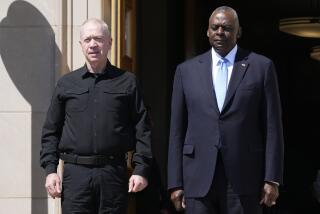WASHINGTON INSIGHT
- Share via
ISRAELI CARD: White House officials are girding for the possibility of increased tensions with Israel as Iraq’s Saddam Hussein escalates his military threats to Jordan and neighboring countries.
Washington wants the Israelis to sit tight and not unleash their own attack against Iraq if Saddam sends troops to Jordan, as he has threatened to do. Israel has warned before that it would retaliate against Baghdad if the Iraqis attacked Jordan, which is on Israel’s border. But Bush Administration strategists fear that any such sortie would reunite the Arab bloc and upset the balance that is supporting U.S. forces in the area.
“Attacking Jordan is Saddam’s wild card,” one senior American official said. “He wants to pull in the Israelis and re-establish Arab unity. It’s the last thing we can afford.”
BAKER’S DISSENT?: Secretary of State James A. Baker III’s low profile during the past week of the Iraqi crisis has spawned new speculation that he may not fully support what President Bush is doing in the gulf.
Baker was conspicuously absent from some of Bush’s most important strategy sessions at Kennebunkport, Me., earlier this month, letting National Security Adviser Brent Scowcroft and Defense Secretary Dick Cheney take the lead.
Baker aides insist that the secretary’s absence stemmed more from his vacation plans. And State Department spokesman Richard Boucher, seeking to blunt speculation about his boss’s misgivings, took pains to tell reporters that Baker has been busy telephoning foreign ministers of U.S. allies, and had spoken to the President twice on Friday alone. The denials were supported by top Bush aides. “If you look at how (Baker) has been working, he’s a key component of our policy,” a Baker loyalist asserted.
Even so, one low-level official complained that the secretary’s main--virtually his only--interest, these days, is the Soviet Union. “He seems to talk to (Soviet Foreign Minister Eduard A.) Shevardnadze and no one else,” he said.
DRUG RELIEF: Bush’s decision to send troops to the Middle East is being greeted with enthusiasm--and perhaps with relief--by one group: the kingpins of the Latin American drug cartels.
Before Iraq invaded Kuwait, the military had been paying increased attention to drug interdiction, partly as a way of employing American forces following the end of the Cold War with the Soviet bloc.
Now, intelligence analysts say, with AWACS planes and other surveillance aircraft redeployed to the Persian Gulf, drug kingpins have begun spreading the word that it may be time to reintensify smuggling efforts.
BUDGET ACCORD: President Bush finally may have found a fitting incentive to prod White House and congressional budget negotiators into hammering out an agreement to reduce the federal budget deficit: He’s planning to lock them in a room until they do.
Administration officials say the lawmakers have accepted an invitation to hold the next round of budget talks--scheduled for Sept. 6 and Sept. 7--locked in a hangar or barracks at Andrews Air Force Base, just outside Washington.
It wasn’t immediately clear whether White House officials would allow the negotiators to leave if they fail to reach a deficit-reduction agreement this time.
More to Read
Get the L.A. Times Politics newsletter
Deeply reported insights into legislation, politics and policy from Sacramento, Washington and beyond. In your inbox twice per week.
You may occasionally receive promotional content from the Los Angeles Times.










